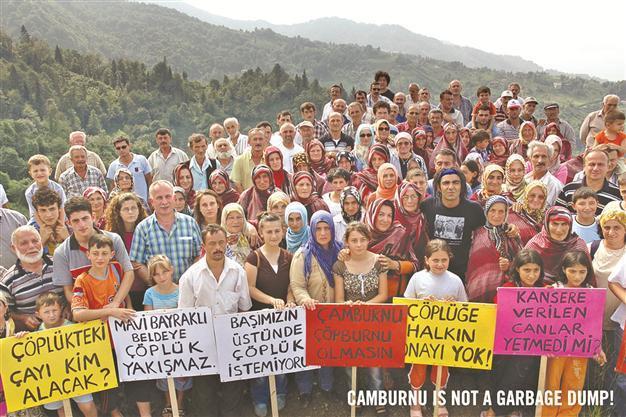Turkish documentaries expose environmental mishaps
Emrah Güler ANKARA - Hürriyet Daily News

Fatih Akın’s documentary, ‘Polluting Paradise’ is a passionate plea to stop the impending environmental catastrophe in Çamburnu and for its people.
Following a special screening at this year’s Cannes, another one at the recent Golden Boll Film Festival and a showing in front of a Turkish audience at the hip film fest Filmekimi, Turkish-German director Fatih Akın’s anticipated documentary, “Polluting Paradise” (Der Müll im Garten Eden), hits theaters this week.
The paradise in question is Akın’s hometown, Çamburnu, a small mountainous town along the eastern shores of the Black Sea. The beautiful environment and its nature were threatened when the former copper mine right above the village was turned into a garbage landfill for the entire province of Trabzon by the government in 2007.
Akın learned about the potential environmental disaster when he was filming scenes for his 2007 feature “Auf der Anderen Seite” (Edge of Heaven). In “Polluting the Paradise,” he documents the struggles of the residents and those working in the landfill over a period of five years, as well as the impact of the garbage on the streams, not to mention an overpowering stench in the area.
The film is less an objective documentary and more a passionate plea to stop the impending environmental catastrophe for the town and its people. And it seems that Akın’s plea seems to be working.
A week prior to the premiere of the movie in Turkey last June, Trabzon Gov. Recep Kızılcık held a press conference telling people that the current situation was quite different than it was in 2007 and that the environmental problems had been partially solved.
Akın is also headed to receive the German Peter-Weiss Award next month for maintaining the late German writer and film producer Peter Weiss’ “opposition to political and social situations” and for having his works drawing “attention to the issues of his homeland.”
But “Polluting the Paradise” is not the only film in recent Turkish cinema focusing on the environment issues in Turkey. In fact, a diverse selection of features, as well as long and short documentaries, have been hitting the festival circuit, winning awards here and abroad in the last two years.
Powerful messages from two female directorsThe struggles of the people of the Black Sea to preserve their nature are chronicled in yet another recent documentary, Rüya Arzu Köksal’s “Bir Avuç Cesur İnsan” (A Few Brave People). Köksal is no stranger to tackling the destruction along the Black Sea coast, having already produced two award-winning documentaries in the past, “Son Kumsal” (The Shore) in 2008 and “Ordu’da Bir Argonot” (An Argonaut in Ordu) in 2010.
“A Few Brave People” is about the struggles of people living around three valleys in the Black Sea region – Çağlayan, İkizdere and Senöz – as they fight to protect their rivers and their land against the government’s insistence on selling them to private corporations to build hydroelectric plants.
The film follows the locals over the course of three years as nature is gradually destroyed in Senöz, as the conflict emerges between those who resist the destruction of their lands and those who view the plants as a potential for employment in İkizdere, and as a grounded, strong campaign against the state begins in Çağlayan.
Another young female director, Akile Nazlı Kaya, screened her short docu-animation, “Dünyayı Kurtarmaya Çalışanlar” (The People Who Try to Save the World), at the recent Adana Golden Boll Film Festival in the international documentary section. The 30-minute film takes its name and borrows footage from the Turkish cult classic, the space adventure of the 1980s, “Dünyayı Kurtaran Adam” (The Man Who Saves the World).
The short documentary is an experimental film on the debates over seeds and endangered biodiversity in Turkey. Intermingled with animated sketches and footage from “The Man Who Saves the World,” Kaya’s camera follows three people as they reflect upon local seeds and sustainability through their expertise.
The film won the best short film award at the Green Film Festival in Seoul last May.
